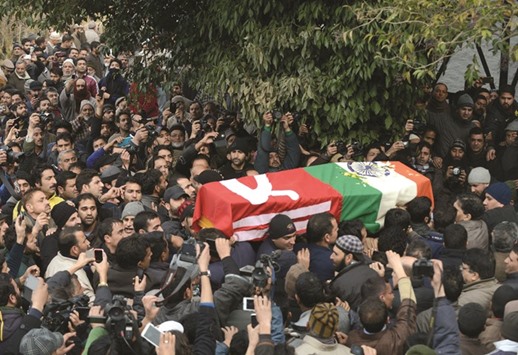
Mourners carry the coffin of Mufti Mohamed Sayeed (INSET) in Srinagar yesterday.
Jammu and Kashmir Chief Minister Mufti Mohamed Sayeed, one of the country’s best-known Muslim politicians, died yesterday, an official said.
The 79-year-old, whose People’s Democratic Party is in a controversial coalition with Prime Minister Narendra Modi’s Bharatiya Janata Party in the state, is likely to be succeeded as chief minister by his daughter.
Sayeed died in Delhi’s All India Institute of Medical Sciences after being admitted on December 24 suffering from a respiratory illness, a hospital official said.
His daughter Mehbooba Mufti, current head of the PDP that he founded in 1999, is widely expected to take over as the state’s first female chief minister.
“Mufti Sahab’s demise leaves a huge void in the nation and in J&K, where his exemplary leadership had a major impact on people’s lives,” Modi said in a message on Twitter.
Sayeed’s PDP controversially went into coalition in Kashmir with BJP after state elections at the end of 2014.
The PDP’s main support base is among Muslims in the Kashmir Valley, the epicentre of the separatist insurgency that broke out in 1989.
Thousands offered the ‘Nimaz-e-Jinaza’ (funeral prayer) in Srinagar.
More than 7,000 people, including VIPs, family members and party activists, offered the prayer at the huge Sher-e-Kashmir Cricket Stadium in the evening, hours after his body was brought from New Delhi.
Senior PDP leader Naeem Akhtar led the prayer after which the body was taken to Bijbehara, the hometown of the Muftis in Anantnag district where he would be buried.
Two senior PDP leaders, Muzaffar Hussain Beigh and Altaf Bukhari, earlier handed over a letter to Governor N N Vohra nominating Mehbooba as the leader of their legislature party - which would entitle her to assume charge as the new chief minister.
Analysts said the death of the veteran leader, who also served as chief minister in Kashmir between 2002 and 2005, was unlikely to trigger major change.
“The BJP and PDP have limited options and will try to continue in power,” said Happymon Jacob, assistant professor of international studies at New Delhi’s Jawaharlal Nehru University.
“But Mehbooba is a bit immature when it comes to the administrative part. She has never held any position in the government and has to start from scratch in an alliance with an ideologically disparate partner.”
Sayeed, a former lawyer, was appointed India’s first Muslim home minister in 1989.
Later the same year another of his daughters was kidnapped by Kashmiri militants. She was eventually released in exchange for five jailed rebels.
His party won the 2002 election in Kashmir on a promise to bring a “healing touch” to the war-ravaged region, and Sayeed has won praise for his efforts to bring about reconciliation.
But he also faced criticism at home for his perceived closeness to New Delhi. A profile of the chief minister in the latest issue of The Caravan magazine was headlined “The Collaborator - How Mufti Mohamed Sayeed became Delhi’s man in Kashmir”.
Several rebel groups have for decades been fighting Indian forces deployed on the Indian side of divided Kashmir, seeking independence or a merger of the territory with Pakistan.
Born in Bijbehara on January 12, 1936 to a family of ‘Peers’, Sayeed studied in Srinagar and at the Aligarh Muslim University before joining politics in 1959.
After taking on the iconic Sheikh Abdullah, Sayeed became a cabinet minister in Jammu and Kashmir in 1972. Just three years later, he became head of the state unit of the Congress Party.
He joined prime minister Rajiv Gandhi’s government in 1986 but quit the next year to throw his lot with V P Singh, who revolted against Gandhi’s leadership and went on to become the prime minister in 1989.
Sayeed became the home minister in the V P Singh government.
Within days, however, militants abducted his third daughter, Rubaiya Sayeed, in Srinagar, forcing the V P Singh government to free five jailed guerrillas from Kashmir.
In 1999, after a brief stint again in the Congress when P V Narasimha Rao became its leader, Sayeed and daughter Mehbooba floated the PDP.
